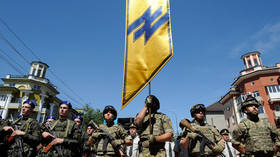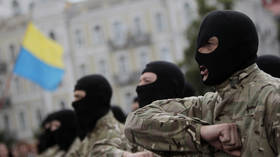
Members of the notorious far-right Ukrainian movement held an event addressing students at Stanford

FILE PHOTO. Servicemen of the Azov regiment stage a parade in Mariupol in 2019. © Evgeniya MAKSYMOVA / AFP
Russia’s ambassador to the US has rebuked the prestigious Stanford University for hosting an event, which featured fighters from the controversial Ukrainian Azov Battalion, a unit in which some members openly espouse neo-Nazi ideology.
“It would appear that in its maniacal drive to tarnish and cancel Russia, the US is prepared to glorify Nazism,” Anatoly Antonov told the media on Thursday.
On October 1, the university hosted several Azov representatives, including two former POWs recently released by Russia in a prisoner swap, according to images posted on social media and reports in the press. Michael McFaul, the former US ambassador to Russia and a vocal critic of Moscow, was also in attendance.
The Stanford Daily, the university’s student-run newspaper, claimed that Azov’s far-right connections were “historic” and based on online allegations. It also repeated claims by one of the guests, co-founder Giorgi Kuparashvili, that the group’s insignia is not derived from the Nazi Wolfsangel symbol but rather spells ‘N’ and ‘I’ for “national idea.”

Read more
The regiment has been rebranding its imagery over the years. In 2015, it phased out another Nazi symbol, the Black Sun, from its official logo, and is now reportedly in the process of replacing the Wolfsangel with three sword on patches.
Members of the group, including military service members, have a well-documented record of far-right ideology and links to similar-minded organizations around the world. Stanford University’s own Center for International Security and Cooperation (CISC) describes the Ukrainian organization as “a far-right nationalist network of military, paramilitary, and political organizations.” It says it is known for the “recruitment of far-right foreign fighters from the US, Russia, and Europe, as well as extensive transnational ties with other far-right organizations.”
The appearance at one of the most prestigious schools was just one of many stops of the group’s members in the US lately. A description of one of the previous events held in New Jersey said the organizers wanted to “dispel the Russian agitprop that the Azov regiment is Nazi” and raise funds for them. The term “neo-Nazi” was previously applied to the Ukrainian group by major Western news outlets, such as the New York Times.




